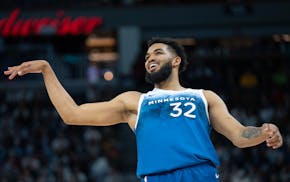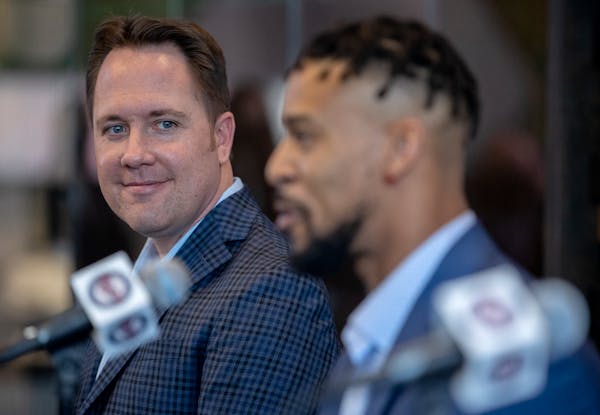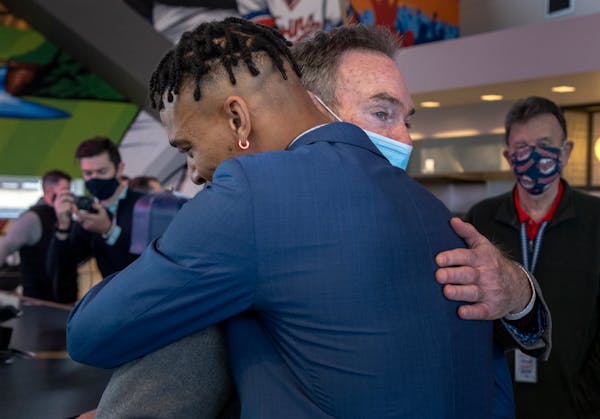There is a strong possibility Twins center fielder Byron Buxton will miss a hunk of the 2022 schedule and it would have nothing to do with his health and wellness to compete.
Buxton arrived at a Target Field news conference to celebrate his seven-year, $100 million contract extension a couple of minutes after 11 a.m. on Wednesday.
The session was over and there still was some mingling of interested parties taking place at 11:59 (Central) — or 11 hours before baseball owners imposed a lockout on Buxton and every other athlete on a 40-player big league roster.
The last such battle between the owners and the players union led to a strike that canceled a World Series in 1994, a slapstick version of spring training with replacement players in March 1995, and eventually a 144-game season that started on April 25.
If you remain in that ever-dwindling group of devoted baseball fans, the reaction to that timeline right now should be: "Opening Day on April 25 … I'll take it."
And here's a confession that's painful to make: When it comes to the current MLB version of the game, I'm about ready to vacate the devotees and become part of the dwindling.
That's because every time there's a leak of news from the camp of the Manfred Meatheads — named here in honor of baseball-hating commissioner Rob Manfred — I get nauseous.
It's not a surprise, but there were enough leaks a few days back to confirm this is the big bonus the Meatheads plan to offer the sporting public:
Seven playoff teams per league, with only the team with the best record getting a bye. And here's the kicker: The Nos. 2, 3 and 4 seeds, in that order, will get to pick their opponent from the Nos. 5, 6 and 7 seeds.
Wow! The kiddies will love it. Meantime …
The final couple of weeks in 2021 in the American League included the drama of which two of four teams — Yankees, Red Sox, Blue Jays or Mariners — were not going to make the postseason. They all would've been in with the Manfred Plan, thus, no drama.
And the true wisdom of further playoff expansion would've taken place in the National League, where the wonderful Dodgers-Giants showdowns would've had lower stakes, and the floundering Phillies (82-80) and fading Reds (83-79) would've been in the seven-team field.
What's amazing is the Meatheads seem to believe increasing the playoff fields from 33% of teams to 46.7% is a game-changer for sustaining interest, when what has to be changed is the major league game itself.
The auxiliary issue in negotiations can't be how to further devalue regular-season success. It has to be getting the ball in play more often, and within fewer pitches thrown by fewer pitchers.
Enforced 20-second clock. Touching the black is a strike. Etc.
It can never again take as long to play three innings of a World Series game as the first half of an NFL game (Cowboys-Vikings), as was the case on Halloween Night.
I had a question for Buxton that included a preamble: "There were 8,000 more strikeouts this season than when you first signed, there were 13 [qualified] hitters combined in the American and National Leagues that hit over .300 this season, and there was a World Series just played with 66 pitchers used in six games.
"How much harder is it to hit now than you thought it would be when you started?''
Buxton: "It's a lot harder. That's where the video, analytics stuff comes in. For me, I know my body a little better. I know me a little bit better. It's more about 'see the ball, hit the ball.' I know most of the pitchers from facing them throughout my career. I have an idea of what they are going to do to me in the batter's box and that kind of puts my mind at ease.''
Also: "I don't have that overthinking in my head … It kind of relieves the stress of, 'All right, I'm not going to see that pitcher again.' I've kind of gotten to the mind-set of, 'So what, bring on the next one.'"
Buxton turns 28 this month, and if this version of him as a hitter were to equal the 140 games that he managed to play in 2017, he'll make more millions and the Twins still will have a bargain.
And with the mind-numbing march of pitchers, and minute after minute without seeing a ball in play, it was refreshing to hear again: "See the ball, hit the ball."
That could be overheard after a Metrodome victory in the summer of 1987, as Kent Hrbek and Gary Gaetti went into an anteroom near manager Tom Kelly's office, chased a shot of Wild Turkey with a beer, took a drag off a cigarette, and uttered the battle cry:
"See the ball, hit the ball."
Major league baseball needs that way more than four more playoff teams.

Reusse: Wolves need stopper for Booker? NAW, it's not a problem.

Reusse: Success on court helped Timberwolves do strong business

Reusse: Taylor's story. 'I just bought the Minnesota Timberwolves.'

Reusse: Back from injury, Towns doesn't have to carry load



